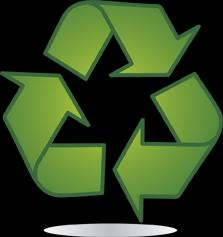
3 minute read
Recycle or Reuse
Recycle or reuse ?! By Selen Altiok
The decision to recycle or reuse products has been a reoccurring struggle of mine for quite a while. Which one is better? Well, better for what? Better for the environment or for individual lifestyles? At points, I feel as if both are correct and that it is a lifestyle everyone should strive for—reusing as much as they can. I thought it would be easy! Products are bought and the left over containers, plastics and glass can be creatively used for something else. Last year I attempted this lifestyle due to an inspiration from the book No Impact Man by Colin Beavan. I thought this man was incredible and his deeds to his family and his environment were impeccable. He cared for his environment probably as much as he cared for his family—the two coincided in his eyes. In order to have a healthy family, a clean environment is necessary. I was and still am very touched by his story. After finishing this book, I decided to have a little adventure myself and only create food waste. Oh was I in for a rude awakening.
I completely underestimated the total amount of waste I create as just one individual. The first day was not all that bad; I was very careful with buying things I knew I could not reuse and made sure not to pick up non-reusable containers. What I could not comprehend was how to cut out the little things I threw out such as napkins, toilet paper, cotton ear swabs, floss, etc… I definitely did not want to blow my nose into a handkerchief (plus I still do not understand how it can be used multiple times a day). After the second or third day, I realized this challenge was more arduous than I thought. Instead of including the little things, I strictly focused on minimizing waste when it came to buying. I avoided and still avoid plastic bags, paper cups for coffee (even though carrying a travel mug can be tedious), any plastic utensils, and take-out boxes. One of the habits I have developed is avoiding excessive packaging at the grocery stores. Why does one pepper need to be wrapped several times on a Styrofoam- like plate? That creates so much waste for just one pepper! This is why I enjoy shopping at smaller, organic markets because they have products in bulk and nothing is pre-packaged. I favor bringing my re-usable bags and containers to these small markets because reducing waste is very doable in these places. Instead of going to Shoprite and paying 10 dollars for a flimsy, plastic tub of almonds, I can bring my sturdy container to one of these organic markets and fill it with as many almonds as I want. It’s great! Over the past 2 years or so, I have developed behaviors that aid me in reducing waste since I truly think reusing is the best option for the environment. For individual lifestyles, reusing is certainly troublesome and can be frustrating. Developing awareness while shopping can help reduce waste by becoming aware about packaging, and that can be a starting point for countless individuals.

Recycling, on the other hand, is a much more deceptive means of attempting to reduce waste. Although it seems like a simple process, many people lack the knowledge of what can and cannot be recycled, leading to an epidemic of ‘reckless recyclers’ who just toss everything that seems to be recyclable into the recycle bins and throw everything else in the garbage. From the plastic caps on bottles to the foamy packaging that comes off almost everything from supermarkets, there are many things that shouldn’t end up in the recycling bin, but inevitably do. So, it may be that the best way to help with New Jersey’s waste problem would be to educate more people on reusing and recycling properly. I honestly perceive it to be a more enjoyable and healthy lifestyle; however, like I have mentioned earlier, it does take time and patience to develop such habits. Once it is a regular habit however, it is one step closer to helping our environment stay disconnected from our garbage and waste.










